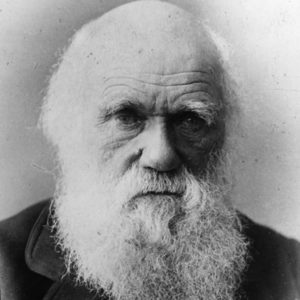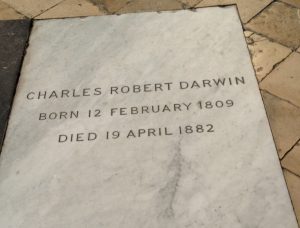Today in London we will visit the Natural History Museum. Often called a “cathedral of nature” the museum is home to many of the specimens collected by Charles Darwin. This will be our second experience with Darwin on the trip. The first was at Westminster Abbey where he is buried.

Darwin’s work would not have been possible without a keen sense of “deep time,”an understanding of time on a multi-million year scale. Deep time is difficult for most people to grasp because it can’t be experienced directly. Functionally, the difference between a thousand and a billion years is meaningless to any individual. Yet, the difference is profound in evolutionary terms. To demonstrate, consider that a thousand seconds a just over 16 minutes. A billion seconds is over 30 years.
Darwin’s keen understanding of the ramifications of deep time coupled with his dedication and brilliant insight yielded an idea that has been the guiding principle of the life sciences ever since. In my Evolutionary Psychology course, I try to impress upon students an understanding of deep time. Modern humans have been around for only about 200,000 years. Many of the behaviors in which we engage have been shaped by evolution over this time and by the time before in our evolving ancestors.
Darwin himself saw the potential for evolutionary theory to make an impact on Psychology:
“In the distant future I see open fields for far more important researches. Psychology will be based on a new foundation, that of the necessary acquirement of each mental power and capacity by gradation. Light will be thrown on the origin of man and his history.”
― Darwin, The Origin of Species, 1859
Unfortunately, it took Psychology a long time (over 200 years) to finally begin recognizing what Darwin clearly saw. Today, Evolutionary Psychology is a rapidly growing multi-disciplinary field. However, not unlike Darwin’s original ideas on evolution, it was initially met with scorn and even ridicule. As recently as 1997 Cognitive Psychologist lamented that in the Psychological Sciences
“Evolution is said to be irrelevant, sinful, or fit only for speculation over a beer at the end of the day.”
― Pinker, How the Mind Works, 1997
That Darwin is buried in Westminster Abbey is a bit of a surprise given how his ideas challenged the current views of the Anglican Church at the time. Darwin himself expected to be buried at St. Mary’s in Downe. However, through the efforts of Sir Francis Galton (Darwin’s cousin), some members of Parliament, and the public a petition was made to the Dean of the Abbey to lay Darwin to rest at Westminster. It was immediately accepted. The simple inscription on Darwin’s grave belies his enormous contributions:

Our trip to London revolves around the theme of “Time and Space.” However, in the human experience, time and space are inexorably intertwined with knowledge, relationships, beliefs, and ideas. Our xperiences in London have brought these themes front and center for me. One can hardly visit Westminster and not consider that our time on earth is limited. Nor can one visit Stonehenge and ignore the beliefs and ideas of those who created it. Exchanging perspectives and ideas with such an interdisciplinary group of colleagues over dinner or at a pub is an experience that enriches the time that we share here and will enhance our time going forward.






Love the blog and the opportunity to read about deep time, which–if it’s something we discussed in our group over the year–is a concept that I didn’t get from our group discussions.